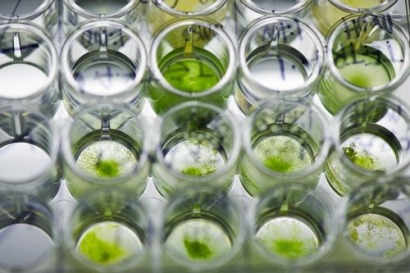
Dr. Adeniyi Lawal’s team will attempt to develop a transformative technology that converts the renewable and abundant supply of algae into cost-competitive, high-performance biofuels. The research is being funded by the U.S. Department of Energy Office of Biomass Program which will be providing a $650,000 grant.
Existing technology uses corn to produce significant amounts of ethanol for blending with gasoline, but with increasing demand for food and widespread drought, the price for corn has skyrocketed, raising prices significantly for both food and fuel. The research team is therefore developing a transformative technology that converts the renewable and abundant supply of algae into cost-competitive, high-performance biofuels.
“With the United States alone consuming approximately 140 billion gallons of gasoline per year, it is clear a non-food biofuel feedstock biofuel must be developed to relieve the strain on food production” said Dr. Michael Bruno, Dean of the Charles V. Schaefer, Jr. School of Engineering and Science. “With global implications such as reduced reliance on foreign oil and efficient methods of green fuel production, Dr. Lawal’s research is critical.”
Some strains of microalgae can double their mass several times per day. They are found in fresh and saltwater bodies and are promising candidates for an efficient and green source of biofuel. In some strains, more than half of the organism’s mass consists of energy-rich lipids or triglycerides that can be used to produce 100 times more oil per acre than any other oil-producing crop. Although the technology shows tremendous promise, researchers have struggled to establish an efficient and cost-effective process for the microalgal biofuel production.
To overcome this obstacle, the research team has proposed a new commercially viable process to convert microalgae to diesel in three steps. First, algal oil is extracted from microalgae. The oil is then purified of metals and metalloids to produce cleaner, pre-refined algal oil. Without this unique pre-refining approach, the high level of contaminants in crude algal oil would rapidly deactivate the catalysts, making it impossible to convert to green diesel. The final step is a process called hydrodeoxygenation, in which hydrogen is added to the purified algal oil to remove oxygen, creating diesel with the clean byproduct of water (H2O).
“The entire process is CO2 neutral, making microalgae-based diesel more environmentally friendly than fossil fuel based-diesel,” said Dr. Lawal. “Carbon dioxide from the atmosphere is taken in via photosynthesis in microalgae, and returned to the atmosphere when the final diesel product is converted into CO2 through combustion.”
In addition to Stevens faculty, the research team comprises two industrial partners and two consultants. The principal industrial partner is SRS Energy (now Valicor Renewables LLC), which will perform the extraction and purification steps in the process. The second industrial partner is BASF Catalysts LLC, which supplies the catalysts integral to the work at Stevens for the challenging final step of hydrodeoxygenation. Dr. Brian Goodall, Vice President of Business Development at SRS Energy and Dr. Robert Farrauto, former Vice President of Hydrogen and Fuel Cell Technology at BASF Catalysts LLC, are co-principal investigators in the project. Dr. James Manganaro and Dr. Dongying Qian serve as consultants.
A preliminary economic analysis shows that using microalgae as a biofuel source at a large-scale is cheaper than petroleum-derived diesel. At just 35,000 barrels per day of diesel from microalgae, the production cost is approximately $2.80 per gallon, which is competitive with petroleum-based diesel. According to the proposed study, at larger quantities the cost would be even lower.
Dr. Lawal brings a wealth of knowledge and research innovation to the field having led two major projects on thermochemical conversion of biomass waste to transportation fuel; a DOE-Office of Biomass Program-sponsored project on the distributed production of advanced biofuels from biomass waste, and an Office of Secretary of Defense, DoD program on biomass waste conversion to liquid fuels for national security.
“This important and transformative research encompasses food and energy sustainability,” added Dr. Henry Du, Department Director of the Chemical Engineering and Materials Science Department. “We have only begun to tap the enormous biofuel potential of microalgae.”
Further information:

